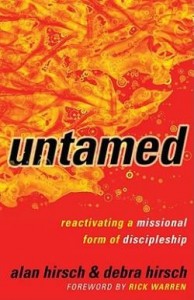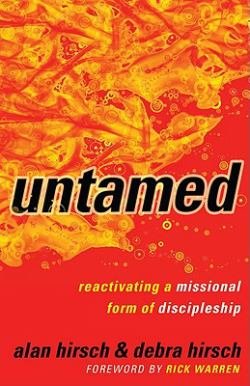 If Alan Hirsch wasn’t a household name among the mission-minded before the VERGE conference, he certainly is now. Alan was kind enough to lend his 6 Elements of missional DNA as the architecture of the VERGE missional community conference. Add to that the outstanding introductory videos that explain each of the 6 Elements, and you’ve got a quite Hirschian splash. As if that wasn’t enough, Alan & his wife Deb drop a new book called Untamed: Reactivating a Missional Form of Discipleship.
If Alan Hirsch wasn’t a household name among the mission-minded before the VERGE conference, he certainly is now. Alan was kind enough to lend his 6 Elements of missional DNA as the architecture of the VERGE missional community conference. Add to that the outstanding introductory videos that explain each of the 6 Elements, and you’ve got a quite Hirschian splash. As if that wasn’t enough, Alan & his wife Deb drop a new book called Untamed: Reactivating a Missional Form of Discipleship.
Structure of Book
Those familiar with The Forgotten Ways will immediately recognize that Untamed is an expansion of one of the 6 Elements of mDNA—missional discipleship. However, the book does not assume this familiarity.
The Introduction is extremely helpful in laying out a map for reading the book. There are four main sections (Theology, Culture, Psychology, Mission), each containing four Signature Themes (Jesus-shaped discipleship, Shema Spirituality, No Mission, No Discipleship, & Of Idols and Prophets).
Recovering the Incarnational Jesus
Chapter One is a cultural exorcism of distorted American Christology, a calling out of moralistic and hypermasculine (read=Mark Driscoll critique) views of Jesus. Could Hirsch be more Jesus-centered than Driscoll?! He levels an irenic but incisive critique. Speaking of men more effeminate than Driscoll’s “caricature of Jesus,†he writes: “they are unacceptable to Jesus as they are…but this strikes a blow against the gospel itself.†Before we start defending and accusing missional leaders, let’s be sure to make this about about Jesus, not personalities, something both Driscoll and Hirsch would want.
Hirsch keeps centering on Jesus. Warning us of cultural stereotypes of Jesus, he says that Jesus must be freed to relate to all people. Hirsch doesn’t simply exorcize the demons, he replaces them with an incarnational Jesus, a Jesus who enters our humanity and empathizes with our condition as the basis and example of mission. On this incarnational note, a couple quotes are worthy of reflection:
- “It is true that Jesus is like God, but the greater truth…is that God is like Jesus!†(36)
- “Jesus holiness was compelling. Sinners flocked to him.†(46)
- “For Jesus, acceptance must precede repentance.†(48)
I love the first two quotes but have some pause on the third. I’m sincerely grateful for this book, chapters one and nine in particular, which underscore and unpack an incarnational way of following Jesus. I’ve been provoked, challenged, and encouraged. Thanks, Alan & Deb!
 At our inaugural PlantR Microconference, we are hosting Alan Hirsch on the topic of Missional Discipleship. Session 2 is on Incarnational Mission (how to make disciples).
At our inaugural PlantR Microconference, we are hosting Alan Hirsch on the topic of Missional Discipleship. Session 2 is on Incarnational Mission (how to make disciples).
 m getting rocked on discipleship these days. From my positive experiences in the pub, in the projects or in God’s presence to a deepening desire for more disciples, more discipleship, more life sharing on mission. God is using the Hirsch’s book to call me into deeper missional discipleship—making disciples while on mission.
m getting rocked on discipleship these days. From my positive experiences in the pub, in the projects or in God’s presence to a deepening desire for more disciples, more discipleship, more life sharing on mission. God is using the Hirsch’s book to call me into deeper missional discipleship—making disciples while on mission.